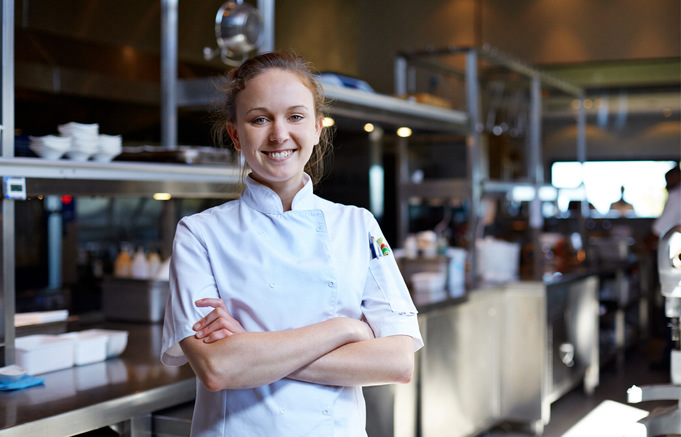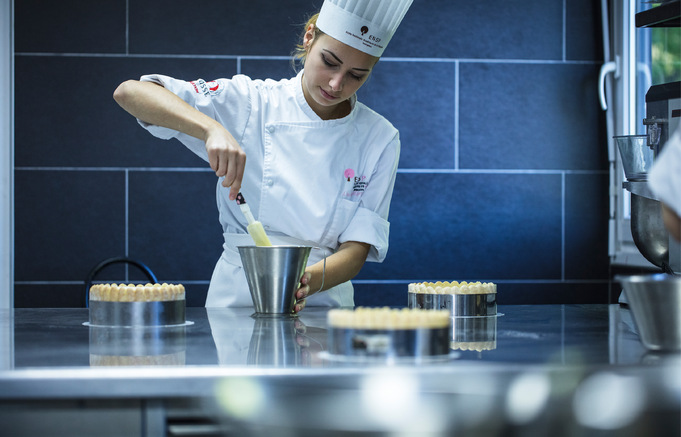Types of chefs and choosing your culinary path

You may be dreaming of becoming a chef that crafts beautiful dishes, but find yourself unsure of exactly what you'd like to specialize in. Discovering more about the different types of chefs you'll find in hospitality could help you choose.
Read on to find out more about what a chef career entails, and what different types of chefs do in their roles.
Introduction to types of chef
Understanding what a chef actually does can often be the first step in deciding whether pursuing a career in the culinary industry is right for you. Here are a few different types of chefs and their duties.
- Executive chef: The executive chef is responsible for ensuring everything runs smoothly in the kitchen and creating menus, among other responsibilities.
- Sous chef: Sous chefs manage all aspects of food preparation, cooking, and plating within a kitchen.
- Pastry chef: Pastry chefs create sweet treats such as cakes, pastries, and desserts.
- Personal/private chef: Personal and private chefs are engaged by clients.
- Catering chef: From creating menus and cooking dishes to overseeing a team, catering chefs are hired to cater private events and parties.
- Research chef: Responsible for developing flavors, food pairings, and recipes, research chefs play a vital role in creating menus and new dishes.
Executive chef
The executive chef is responsible for managing and overseeing the work of other talented individuals, and some of their duties include preparing dishes, planning menus, recruiting chefs, and placing orders for ingredients.
If a career as an executive chef appeals to you, you’ll typically need to complete a culinary arts degree. Upon completing a degree in the culinary arts, you can expect to start in an entry-level position in a restaurant kitchen before working your way up to become an executive chef.
If you’re unsure whether a senior position as an executive or head chef is right for you, you might like to look at the head chef vs executive chef roles and consider what excites you most.
How much does an executive chef make?

Klaus Vedfelt/ Royalty-free via getty images
The annual salary for an entry-level position is around $65,000, with more experienced chefs earning up to $100,000 per year.
What are the educational requirements to become an executive chef?
Most executive chefs are high school graduates with an undergraduate degree in culinary arts and often a master’s degree in a similar subject.
Launch your career in style with a culinary arts degree.
Combining culinary arts training with business and management techniques and valuable internships, our three-year bachelor's degree is ideal for aspiring chefs.
Apply to study for our bachelor's degree in culinary arts today.
What are the different types of restaurants that employ executive chefs?
Executive chefs are employed by almost any venue that has a kitchen. This could include a hotel restaurant, a spa restaurant, a bistro, a café, resorts, and more.
Sous chef
Sous is a French word that translates as "below", and sous chefs work underneath executive chefs. These types of cooks are responsible for preparing dishes and collaborating with other kitchen members. They also assist the executive chef in creating new menus and running the kitchen.
Sous chefs must be able to work well under pressure and be able to lead a team. These skills are often obtained through practical learning, though most sous chefs will have a culinary degree.
Make your dream of becoming a professional chef a reality.
Learn the fundamentals of culinary arts, understand different cuisines, and explore career opportunities with our intensive culinary arts diploma.
Take the leap and change your career with our diploma in culinary arts.
How does a sous chef differ from an executive chef?
The responsibilities differ for both roles. Although sous chefs work under the executive chef and have some responsibilities in management, sous chefs tend to have a more hands-on role within the kitchen.
What are the typical working hours for a sous chef?
A sous chef's typical working hours fluctuate and depend on the restaurant they work in. However, most sous chefs work 40 hours a week or more.
What are the most important skills for a sous chef to have?

Aside from skills in preparing food, some of the most essential skills a sous chef can have include communication, management, leadership, and organization.
What are some common challenges faced by sous chefs?
Time management, busy periods, unhappy customers, staff, and food shortages are all common challenges that sous chefs face in the kitchen.
Pastry chef
If you enjoy making pastries and other sweet treats, then a career as a pastry chef may be for you. Like many other people, you might be wondering exactly what is patisserie, and how to learn more about elevated forms of pastry-making.
Whether working in a patisserie, a restaurant, a hotel, or a café, pastry chefs are responsible for crafting delicious creations while ensuring they are presented immaculately for customers. Pastry chefs normally have formal qualifications such as our Bachelor's in French Pastry Arts.
Learn from leading pastry chefs at École Ducasse.
Master a range of pastry arts skills, learn how to manage a kitchen, and gain practical hospitality experience through internships when you study at our Paris campus.
Discover more about our pastry arts degree.
What are the differences between a pastry chef and a regular chef?
The difference lies within the types of dishes they create. Pastry chefs specialize in baking cakes, pastries, and desserts. Meanwhile, a regular chef will mainly cook starters and mains.
What are some common desserts made by pastry chefs?
Although the list is endless, some of the common desserts made by pastry chefs include:
- Croissants
- Pastries
- Tarts
- Dessert pies
- Cakes
- Macarons
What are the most important skills for a pastry chef to have?
Attention to detail and creativity are among a pastry chef's essential skills. They must be able to create beautifully presented desserts. Other skills include communication, time management, and knowledge of various cooking techniques.
Personal/private chef
Personal and private chefs don’t work within an establishment like a hotel or restaurant. Instead, they work for an individual who hires them on a full-time, part-time, or self-employed basis.
Personal and private chefs are responsible for crafting menus and preparing ingredients before cooking them. They primarily work alone, so other duties include sourcing ingredients, preparing the kitchen, and cleaning the kitchen.
Personal and private chefs must have excellent communication and timekeeping skills. They also need to have business experience and culinary qualifications.
What are some typical tasks performed by personal/private chefs?
Some of the tasks typically performed by personal and private chefs include:
- Designing menus for clients
- Preparing a range of dishes
- Sourcing ingredients
- Liaising with clients
How much do personal/private chefs make?
How much personal and private chefs make depends on their clients, their location, and their experience. A private chef in the US could earn between $49,000 and around $157,000.
What are the differences between a personal/private chef and a restaurant chef?
Personal and private chefs are employed by a client rather than a restaurant or hotel. They also often work alone, whereas a restaurant chef often works within a team.
Catering chef

Catering chefs are responsible for preparing and creating dishes such as canapes at a range of events. As well as executing the design and delivery of food, catering chefs often oversee a team of assistants and manage the business side of running a catering business.
What types of events do catering chefs typically work for?
The types of events catering chefs typically work for vary, but can include weddings, exhibitions, conferences, and private parties.
What are some common challenges faced by catering chefs?
Some of the most common challenges catering chefs face include:
- Client location
- Staff availability
- Client demands
- Product availability
- Finance
- Industry competition
What are the most important skills for a catering chef to have?
Catering chefs must have excellent communication and organization skills. They must also be able to work well under pressure and possess skills such as:
- Decision-making under pressure
- Creativity
- Team management and leadership
How much does a catering chef make?
The amount a catering chef makes depends on the size of the events they are catering for, the location, and the client. Most catering chefs earn an average of around $38,000 annually.
Research chef
Are you interested in finding out more about alternative chef careers? If so, a career as a research chef might appeal to you. Research chefs are responsible for crafting new flavors and developing menus and dishes.
Some of the most sought-after skills for research chefs include:
- Creativity
- Food industry safety knowledge
- Decision-making
- Problem-solving
Research chefs usually require a culinary arts degree, a pastry arts degree, or a food science certification before commencing their careers. Practical experience working within a restaurant or kitchen can also be a prerequisite.
What types of companies employ research chefs?
Food manufacturers, corporations, and restaurant chains are the main companies that employ research chefs.
What are some common tasks performed by research chefs?
Learning new culinary techniques, experimenting with and sampling new flavors, product development, writing new recipes, and designing menus are some of the most common tasks research chefs perform.
How much does a research chef make?
Research chefs can expect to make an average base pay of $37,685.
Conclusion
The role of a chef greatly varies depending on the specialties you choose. Considering where your passions lie is ideal before applying to study at a culinary school like our own culinary school in France.
Once you have decided that working as a chef is a good career, you can begin to think about how to be a professional chef and culinary arts careers to ensure you enroll in courses that will enable you to learn the skills and qualifications that will support you on your career path within the culinary industry.
Photo credits
Main image: Hispanolistic/E+ via getty images


